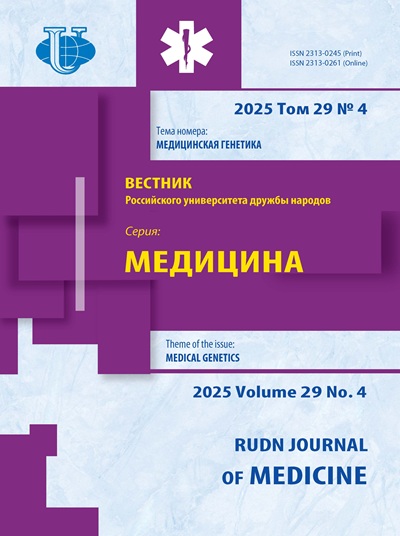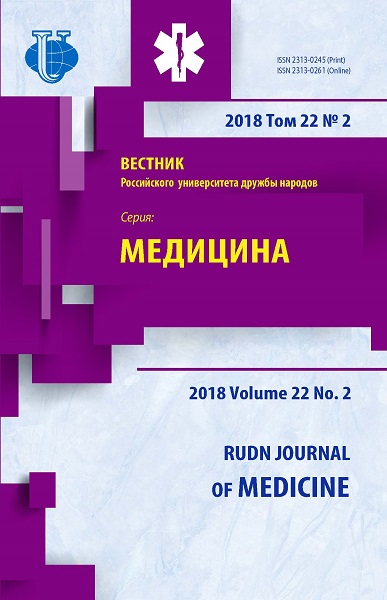MANIFESTATIONS OF FRAILTY IN ELDERLY PATIENTS WITH ACUTE CORONARY SYNDROME
- Authors: Soseliya NN1, Bagmanova NK1, Villevalde SV1, Kobalava ZD1
-
Affiliations:
- Peoples’ Friendship University of Russia (RUDN University)
- Issue: Vol 22, No 2 (2018)
- Pages: 141-147
- Section: CARDIOLOGY
- URL: https://journals.rudn.ru/medicine/article/view/18951
- DOI: https://doi.org/10.22363/2313-0245-2018-22-2-141-147
- ID: 18951
Cite item
Full Text
Abstract
Background. Frailty is a high-priority issue in cardiovascular medicine because of the aging of patients. It reflects the complex functional disorders and is associated with high morbidity and adverse outcomes. The aim of the study was to examination prevalence of frailty, its associations with mortality and hemorrhagic risk in elderly patients with ACS. Materials and methods. In 130 patients ≥ 75 years (82,7 ± 4,7 years, arterial hypertension (AH) 91,5%, previous myocardial infarction (MI) 32,3%, atrial fibrillation 32,3%, diabetes 26,9%, admitted with MI 75,4% or unstable angina 24,6%, frailty (national validated questionnaire), nutritional status (Mini Nutrition Assessment), cognitive function (Mini Mental State Examination) were assessed. Results. Mean score on a national validated questionnaire was 2,9 ± 1,4 points. Only 8.5% of patients responded negatively to all questionnaire questions. None of the patients had 7 points. 6,2, 19,2, 32,3, 23,8, 6,9 and 3,1% patients had 1, 2, 3, 4, 5 and 6 points. 8,5% of the patients were non-frail, 25,4% pre-frail and 66,1% frail. Patients with frailty were more likely women, had higher incidence of AH, MI in this hospitalization, GFR < 60 ml/min/1,73 m2. Conclusion. Frailty occured in 66,1% of elderly patients with ACS, was associated with increased prevalence of cardiovascular diseases.
About the authors
N N Soseliya
Peoples’ Friendship University of Russia (RUDN University)
Author for correspondence.
Email: nini.soseliya@mail.ru
post-graduate student of the Department of Internal Diseases with a course of cardiology and functional diagnostics named after academician V.S. Moiseev
N K Bagmanova
Peoples’ Friendship University of Russia (RUDN University)
Email: nini.soseliya@mail.ru
S V Villevalde
Peoples’ Friendship University of Russia (RUDN University)
Email: nini.soseliya@mail.ru
Z D Kobalava
Peoples’ Friendship University of Russia (RUDN University)
Email: nini.soseliya@mail.ru
References
- Alexander KP, Newby LK, Armstrong PW, et al. Acute coronary care in the elderly, part II: STsegment-elevation myocardial infarction: a scientific statement for healthcare professionals from the American Heart Association Council on Clinical Cardiology: in collaboration with the Society of Geriatric Cardiology. Circulation. 2007. № 115. P. 2570—89.
- Escaned J, Ryden L, Zamorano JL, et al. Trends and contexts in European cardiology practice for the next 15 years: the Madrid Declaration: a report from the European Conference on the Future of Cardiology, Madrid, 2—3 June 2006. Eur Heart J. 2007. № 28. P. 634—7.
- Hanssen M, Cottin Y, Khalife K, et al. French Registry on Acute ST-elevation and non STelevation Myocardial Infarction 2010. FAST-MI 2010. Heart. 2012. № 98. P. 699—705.
- Halter JB, Hazzard WR. Hazzard's geriatric medicine and gerontology (6th ed.). Medical. 2009. 1634 p.
- Fried LP, Tangen CM, Walston J, et al; Cardiovascular Health Study Collaborative Research Group. Frailty in older adults: evidence for a phenotype. J Gerontol A Biol Sci Med Sci. 2001. № 56A. P. 146—156.
- Lang PO, Michel JP, Zekry D. Frailty syndrome: A transitional state in a dynamic process. Gerontology. 2009. V. 55. № 5. P. 539—549.
- Kuller LH, Lopez OL, Mackey RH, et al. Subclinical Cardiovascular Disease and Death, Dementia, and Coronary Heart Disease in Patients 80+ Years. J Am Coll Cardiol. 2016. V. 67. № 9. P. 1013—22.
- Tkacheva ON, Runikhina NK, Ostapenko VS, et al. Validation of the questionnaire for screening frailty. Advances in gerontology. 2017. V. 30. № 2. P. 236—242.
- Folstein MF, Folstein SE, MCHugh PR. «Mini-mental state». A practical method for grading the cognitive state of patients for the clinican. J. Psychiat. Res. 1975. № 12. P. 189—98.
- Guigoz YY, Vellas B, Garry PJ. Mini Nutritional Assessment: a practical assessment tool for grading the nutritional state of elderly patients. Facts Res. Geront. 1994. № 2. P. 15—59.
Supplementary files















